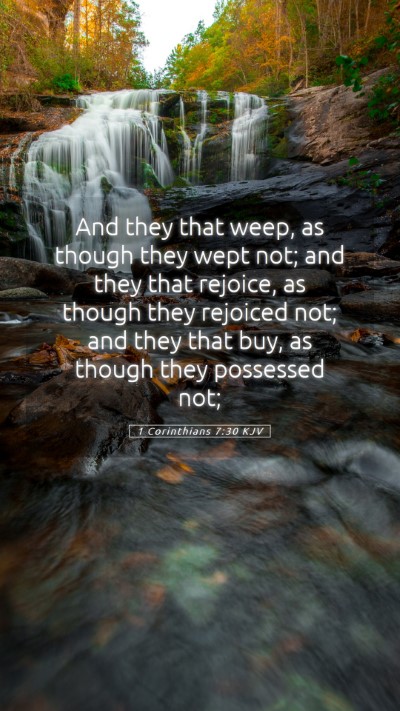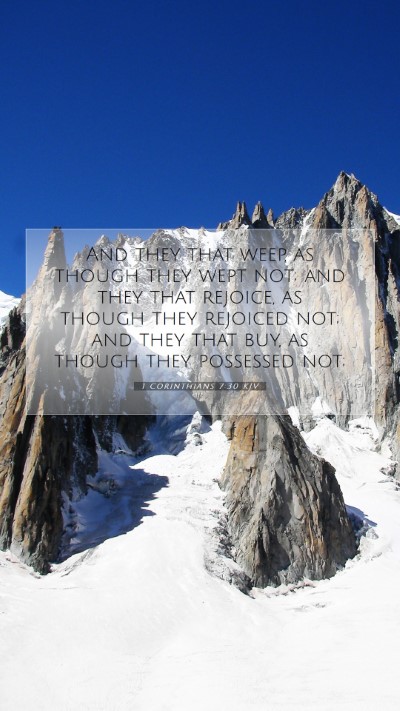Understanding 1 Corinthians 7:30
1 Corinthians 7:30 states, "And those who weep, as though they did not weep; and those who rejoice, as though they did not rejoice; and those who buy, as though they did not possess." This verse encourages believers to maintain a balanced perspective regarding their emotions and possessions in light of the transient nature of life and the eternal implications of faith in Christ.
Bible Verse Meanings
This scripture emphasizes that believers should live with a sense of detachment from worldly emotions and material possessions. According to Matthew Henry, this detachment isn’t meant to suggest apathy but rather to maintain a spiritual focus, knowing that earthly experiences are temporary. Albert Barnes suggests that the emotional state of weeping and rejoicing should be acknowledged, but believers must remember that these are only temporary states, as they are part of a larger spiritual journey.
Bible Verse Interpretations
Adam Clarke interprets the verse as a call for moderation in emotional responses and material interests. Life's vicissitudes—joys and sorrows, gains and losses—are all ephemeral. The Apostle Paul encourages the Corinthians to keep their eyes on the eternal truths of their faith rather than getting bogged down by the momentary nature of their experiences.
Bible Verse Understanding
This verse forms part of Paul's broader discourse on Christian living amid worldly concerns. It highlights the need for believers to prioritize their relationship with God over earthly attachments. Understanding this passage is crucial for anyone engaging in Bible study, as it offers deeper insights into how to balance life's emotional and material aspects with an eternal perspective.
Bible Verse Explanations
- Temporary Nature of Life: Paul illustrates that our emotional engagements with life (weeping and rejoicing) and material possessions are transient.
- Focus on the Eternal: Believers are called to focus on their spiritual state and eternal life rather than being overly committed to the pleasures or pain of the moment.
- Christian Detachment: The verse advocates a form of healthy detachment that allows Christians to engage with the world without being ensnared by it.
Bible Verse Commentary
In examining the commentaries by renowned theologians, it’s clear that the verse serves as a profound reminder of the Christian's mission to live out faith with an understanding that life is fleeting. Matthew Henry articulates that believers should not let life's circumstances cloud their commitment to God. Albert Barnes adds that the call to not overreact emotionally helps believers make wiser choices in their daily lives.
Scripture Analysis
This verse is part of a larger theological framework in 1 Corinthians 7, where Paul addresses issues of marriage and singleness, urging readers to consider how their choices affect their spiritual journey. This helps in understanding the context and applying it to modern Christian living, particularly in Bible study groups.
Biblical Exegesis
Exegetical insights reveal that Paul used hyperbolic language to emphasize the need for an eternal perspective. It invites readers to reflect on how they engage with life’s highs and lows without losing sight of God’s overarching plan. Consider this passage in light of Colossians 3:2, which instructs believers to set their minds on things above, not on things on the earth.
Bible Study Insights
For those participating in online Bible study, this verse serves as an excellent topic for discussion and personal reflection. It provides a basis for conversations about how to navigate life's emotional experiences and how to prioritize spiritual growth over worldly concerns.
Cross References
- Colossians 3:2 - "Set your minds on things that are above, not on things that are on earth."
- James 4:14 - "...what is your life? For you are a mist that appears for a little time and then vanishes."
- 2 Corinthians 4:18 - "As we look not to the things that are seen but to the things that are unseen..."


